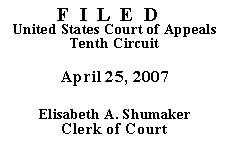

| In re:
CARL ALLEN NAKAGAWA, Petitioner.
NO NAMED RESPONDENT, Respondent. |
|
As noted by the district court, "Mr. Nakagawa's liberally construed amended complaint is vague and, for the most part, unintelligible," R., Doc. 24 at 3, and he has utterly failed to meet his "burden of alleging sufficient facts on which a recognized legal claim could be based," Hall v. Bellmon, 935 F.2d 1106, 1110 (10th Cir. 1991). We also agree with the district court that Mr. Nakagawa failed to comply with the pleading requirements of Fed. R. Civ. P. 8(a) and 10(a). As the district court explained:
The amended complaint does not include a short and plain statement of the grounds upon which the Court's jurisdiction depends. See Fed. R. Civ. P. 8(a)(1). The amended complaint does not include a short and plain statement of his claims showing that he is entitled to relief in this action. See Fed. R. Civ. P. 8(a)(2). The amended complaint does not include a demand for the relief Mr. Nakagawa seeks. See Fed. R. Civ. P. 8(a)(3). The amended complaint also fails to include in the caption to the amended complaint the parties he is suing. See Fed. R. Civ. P. 10(a).
R., Doc. 24 at 3.
These pleading deficiencies do not just implicate Rules 8 and 10, however, as we conclude that Mr. Nakagawa has failed to allege sufficient facts to show the existence of a justiciable case or controversy. Consequently, the district court should have dismissed Mr. Nakagawa's amended complaint for lack of subject matter jurisdiction, and we must likewise dismiss this appeal. See United States v. Wilson, 244 F.3d 1208, 1213 (10th Cir. 2001) ("Under Article III of the Constitution, federal courts have subject matter jurisdiction only over 'cases and controversies.'"); see also Steel Co. v. Citizens for a Better Env't, 523 U.S. 83, 94-95 (1998) ("The requirement that [subject matter] jurisdiction be established as a threshold matter springs from the nature and limits of the judicial power of the United States and is inflexible and without exception.") (quotation omitted).
Accordingly, we DISMISS this appeal for lack of subject matter jurisdiction, and REMAND with instructions to the district court to vacate its prior dismissal order and dismiss Mr. Nakagawa's amended complaint without prejudice for lack of subject matter jurisdiction. In addition, because this appeal is frivolous, we DENY Mr. Nakagawa's motion to pay this court's filing and docketing fees in partial payments; we VACATE the prior order entered by this court on January 24, 2007, assessing partial payments from Mr. Nakagawa's prison account; and we ORDER Mr. Nakagawa to immediately pay the full appellate filing and docketing fees. Finally, we DENY Mr. Nakagawa's petition for hearing en banc.
Entered for the Court
Circuit Judge
*. After examining the briefs and appellate record, this panel has determined unanimously that oral argument would not materially assist the determination of this appeal. See Fed. R. App. P. 34(a)(2); 10th Cir. R. 34.1(G). The case is therefore ordered submitted without oral argument. This order and judgment is not binding precedent, except under the doctrines of law of the case, res judicata, and collateral estoppel. It may be cited, however, for its persuasive value consistent with Fed. R. App. P. 32.1 and 10th Cir. R. 32.1.